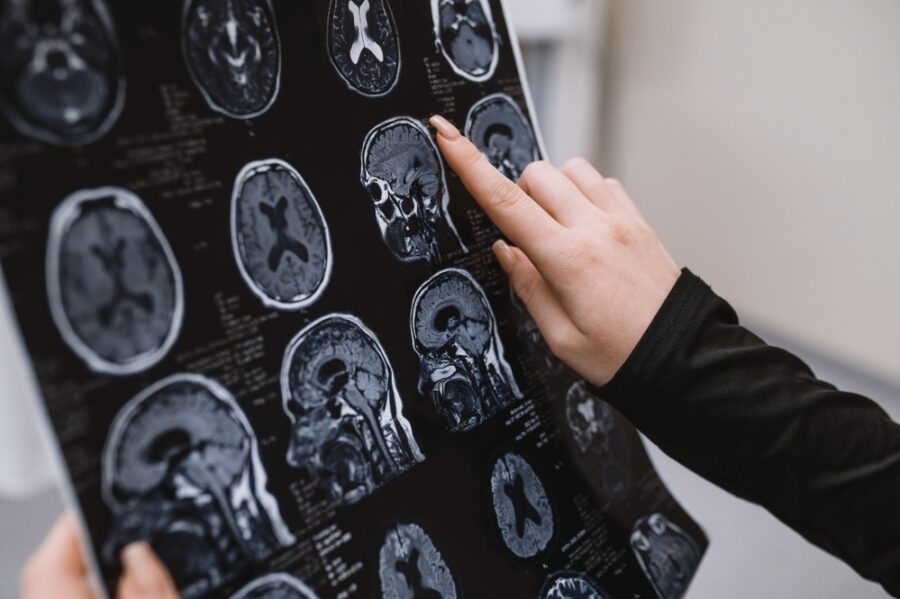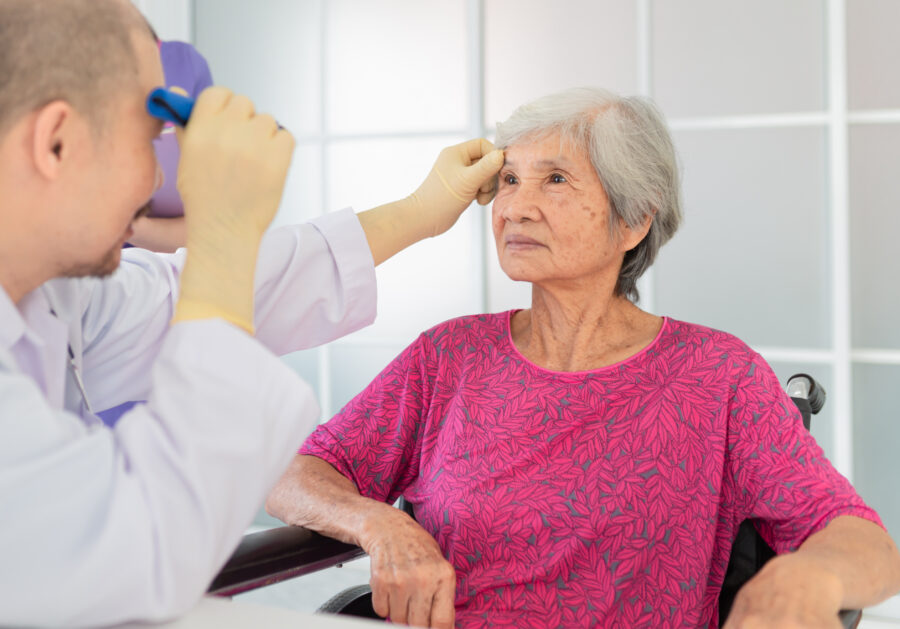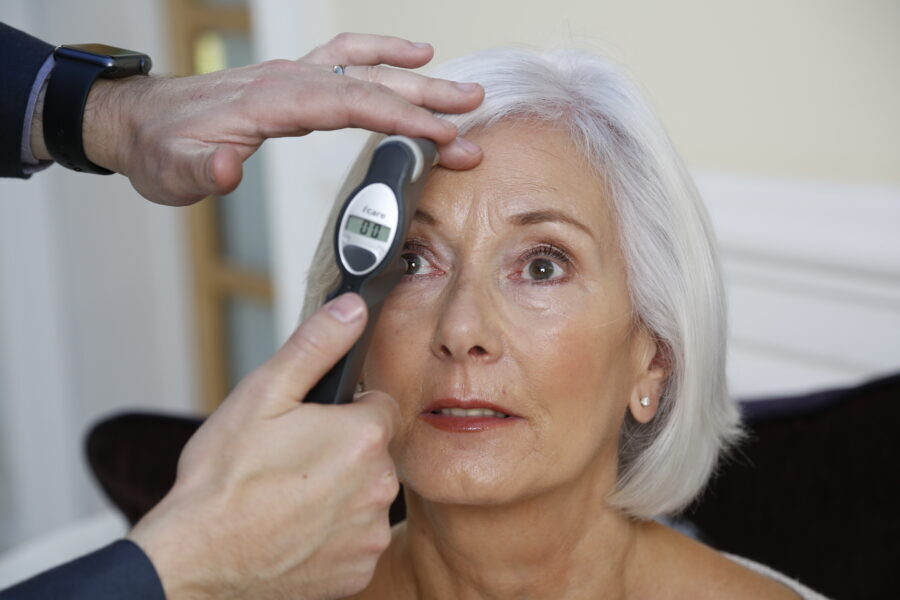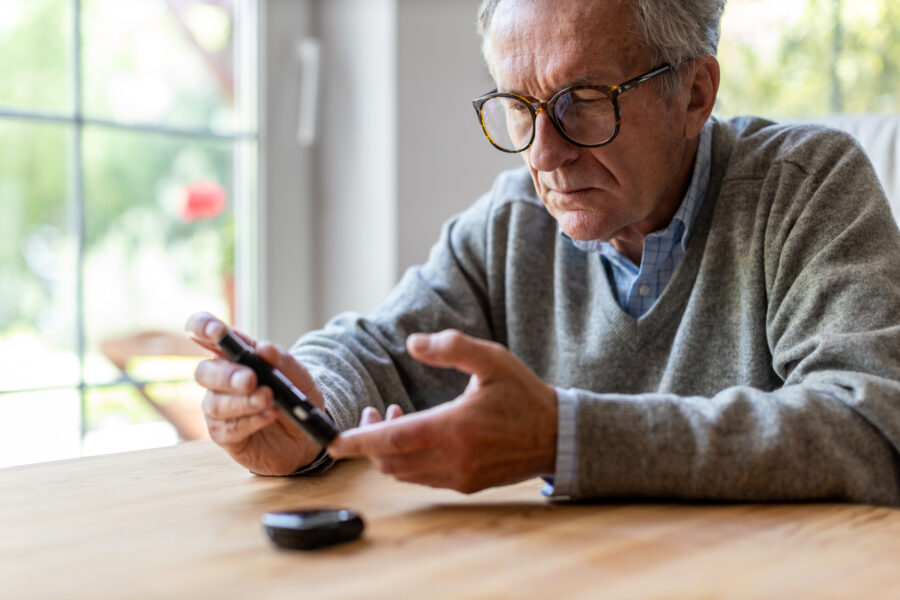Blog post
Vision Loss After a Stroke

Matthew Burford BSc(Hons) Optometry MCOptom - Domiciliary Optician and Professional Services Manager at OutsideClinic
6-8 minutes
How can a stroke impact vision?
A lot of the time, a stroke doesn’t actually affect the eyes, but more the part of the brain that affects vision.
This means that the ability to see properly can be inconsistent, with some days being better than others.

What common vision problems are there following a stroke?
- Hemianopia: After a stroke, some people experience vision loss on one side, known as hemianopia.
- Double vision: This can lead to dizziness and trouble focusing, making it difficult to read, write or perform tasks requiring hand-eye coordination. It can also cause discomfort or strain, leading to avoidance of certain activities.
- Loss of part of the visual field: This can result in bumping into things or people on the affected side, missing parts of a scene (like text when reading) and having difficulty scanning the environment fully.
- Ignoring one side: This may cause an individual to not eat the food on one side of a plate or be unaware of people approaching from the affected side.
- Involuntary eye movement: This can lead to blurred or shaky vision, causing difficulties with reading, watching TV or any task requiring stable vision.

Is vision loss from a stroke permanent?
Vision loss from a stroke can be temporary or permanent.
The recovery depends on factors like the stroke's location and severity, the type of vision problem and the effectiveness of therapy and rehabilitation.
Some vision issues, such as double vision, may improve with therapy and help from visual aids.

How can someone improve their vision after a stroke?
For many patients, their vision will improve naturally by itself in the first few months following a stroke, due to the brain's capacity to adapt.
However, working with healthcare professionals to develop a tailored treatment plan is essential for the best possible outcome. A treatment plan may include:
- Therapy and rehab: Trained therapists work with patients to teach them adaptive techniques and strategies to cope with vision limitations.
- Assistive devices: The use of magnifiers or electronic devices that enhance visual capabilities can help with everyday tasks like reading.
- Glasses: For certain types of stroke-related vision problems, prism glasses can be beneficial. These glasses use special prisms to help redirect images into the part of the visual field that still functions. Additionally, it's crucial to ensure that any remaining vision is as strong as it can be by addressing issues like near or distant sightedness with the appropriate corrective glasses.

How long does it take for vision to improve following a stroke?
Recovery usually occurs within the first few months; however, each individual's experience varies.
When can someone drive again after a stroke?
You must stop driving straight away if you’ve had a stroke. You must stop driving for at least 1 month. If you’re still experiencing problems with your eyesight (for example visual field loss or double vision) after 1 month you must tell the DVLA.
You can restart only when your doctor tells you it is safe to do so.
You can find more information here: https://www.gov.uk/stroke-and-driving

Can an eye test detect when a stroke has occurred?
An eye test alone can't pinpoint when a stroke happened, but it can show signs that suggest a stroke might have occurred. Signs that an Optometrist will look out for include:
- Visual field loss: Tests may reveal areas of missing vision that align with stroke effects.
- Blood vessel blockages: Issues like blockages in the eye's blood vessels may indicate problems related to a stroke.
- Eye movement issues: Abnormal eye movements seen during an exam could hint at neurological impacts from a stroke.
These signs can alert eye professionals to refer someone for more detailed testing, like brain scans, to confirm if a stroke has occurred. An eye test provides pieces of the puzzle, but further medical examination is needed for a full picture.

Can an eye test detect risk of stroke?
An eye test can reveal certain signs that may suggest you have risk factors associated with a higher likelihood of a stroke. Here's what an eye exam might show:
- Blood vessel health: An eye exam can show changes in the blood vessels of the retina, which might indicate high blood pressure or cardiovascular issues, both of which are stroke risk factors.
- Cholesterol deposits: Sometimes, cholesterol deposits can be seen during an eye exam, pointing to a condition that can increase stroke risk.
- Signs of diabetes: Detecting diabetic retinopathy can indicate poorly controlled diabetes, another risk factor for stroke.
Eye tests can uncover important health information, but they are part of a broader picture. While these signs suggest potential health issues, they don't directly predict a stroke.
It's essential to have regular health check-ups to manage stroke risk factors like blood pressure, cholesterol and diabetes outside of just an eye test.

Can someone who has had a stroke have an eye test if they can’t talk?
Yes, they can.
At OutsideClinic, we understand that communication can be challenging after a stroke, that’s why our opticians are trained to adapt the eye test process for individuals who may be unable to speak.
By using non-verbal communication methods, such as letter matching, objective measures and specialised letter charts, we ensure a thorough and accurate eye test.
We also purposely have longer and flexible appointments slots which allow us to do the test at a slower pace if needed.
And there is always the option to have a loved one or carer present during the test for added reassurance.

How to manage vision loss after a stroke?
- Work with specialists to improve vision or adapt to changes: Vision therapy or rehabilitation can help you regain some visual function or learn new ways to cope with vision loss.
- Ask family or friends to always approach from the side where your vision is stronger: This can help you better anticipate their presence and avoid any confusion caused by blind spots.
- Use visual aids while eating: Focusing on one half of the plate at a time can make it easier to manage meals, helping you stay aware of everything on your plate.
- Learn coping mechanisms: Developing strategies like using touch or memory to navigate spaces can make everyday tasks more manageable despite vision loss.
- Adjust spaces: Improve lighting, remove obstacles and ensure clear pathways.
- Place a ruler or line guide under text when reading: This can help you keep track of where you are on the page and make reading less stressful.
Support and guidance with Trinity Homecare
For over 25 years, Trinity Homecare has been supporting stroke survivors in the comfort of their own homes. During this time, they’ve seen how staying in a familiar environment can offer peace of mind and reassurance.
How can Trinity Homecare support you at home?
Trinity’s dedicated team has extensive experience and in-depth training to understand the physical and emotional effects of living after a stroke. Their live-in carers can assist with the following:
- Helping with your daily personal routine – washing, dressing, preparing healthy food
- Providing guidance when taking medication
- Recognising and understanding symptoms such as swallowing difficulties, balance, and mobility challenges
- Encouraging gentle exercise and supporting any physiotherapy guidance – paying careful attention for falls
- Helping you learn new skills and regain independence
- Sharing memories from past times and enjoying good conversation, being a friend when needed
- Accompanying/driving you to appointments
- Helping you staying in touch. Writing letters, phone calls, internet etc.
- Liaising with family on any developing or changing needs
Learn more about Trinity Homecare and the support they can offer


By Matthew Burford BSc(Hons) Optometry MCOptom - Domiciliary Optician and Professional Services Manager at OutsideClinic Post last updated 4th November 2025
Matthew graduated from Aston University in 2004 with a degree in Optometry.

